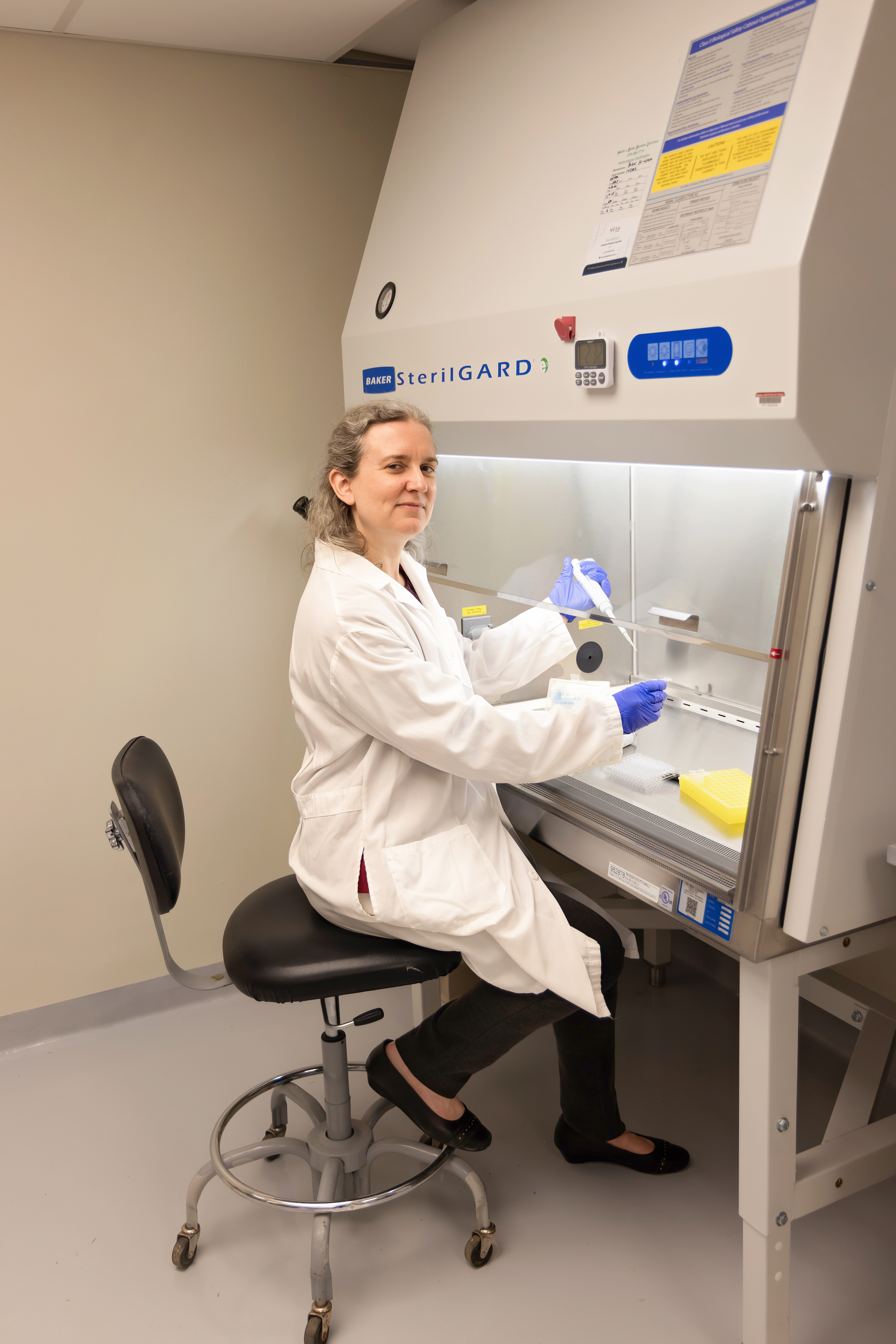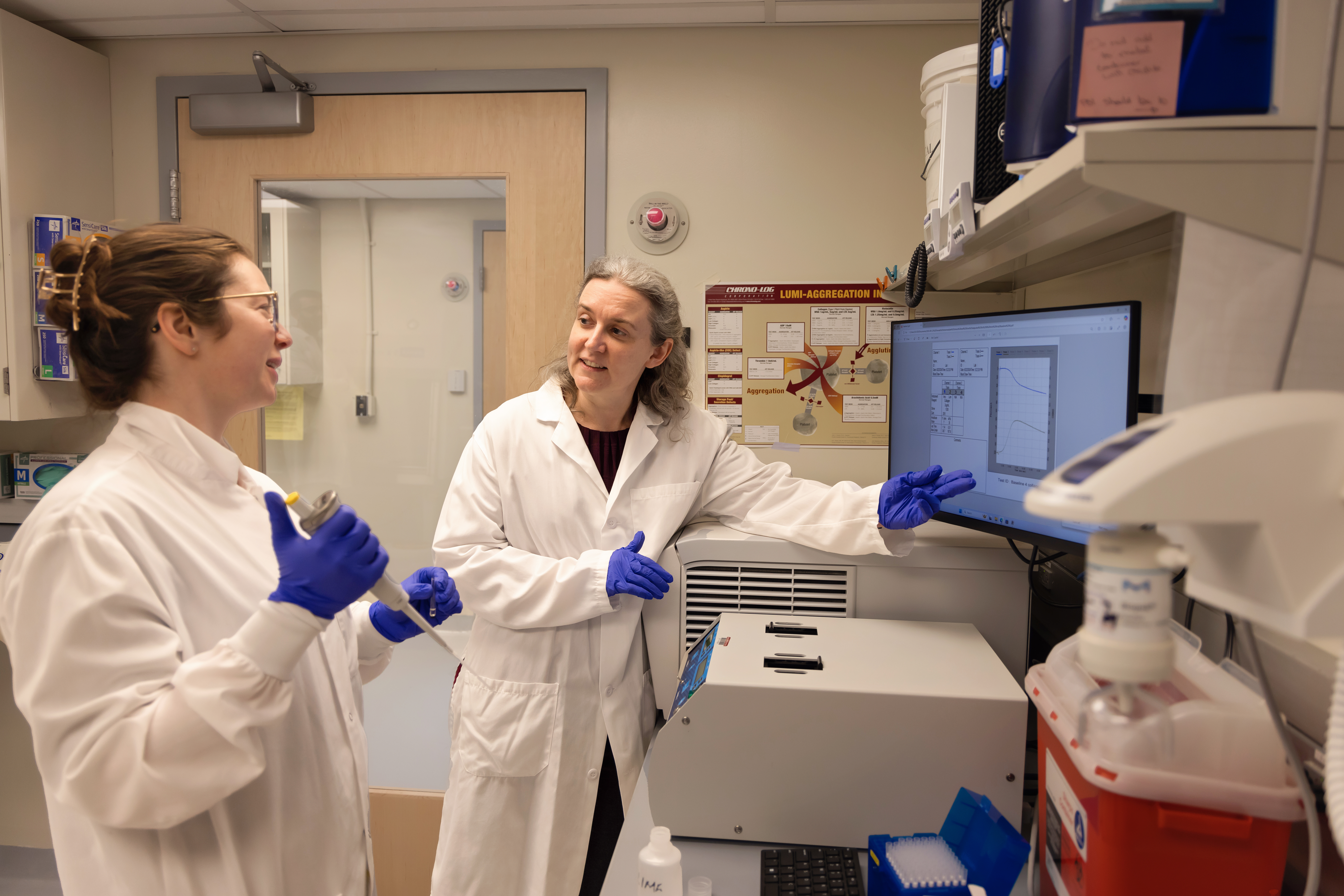Profile of the Director of Massachusetts Institute of Technology’s Division of Comparative Medicine: Kelly A. Metcalf Pate, D.V.M., Ph.D.

Dr. Kelly A. Metcalf Pate, a veterinary scientist conducting research on the role of platelets in disease progression, received three grants from ORIP that were pivotal for her early career training and development (Figure 1). She received support from an NIH-funded T32 program, currently led by Dr. Joseph L. Mankowski (T32OD011089); an ORIP Special Emphasis Research Career Award (SERCA) (K01OD018244); and a Small Grant Program award (R03OD026691).
Dr. Metcalf Pate’s joy for research started as an undergraduate student at Boston University when she worked in Dr. Karen Warkentin’s laboratory studying stimuli that cause red-eyed tree frog embryos to hatch. Although Dr. Metcalf Pate greatly enjoyed this research, she realized she wanted to pursue a career focused on the translational and clinical aspects of human and animal health, leading her to pursue a Doctor of Veterinary Medicine (D.V.M.) degree at Purdue University.
While in veterinary school, she participated in the Veterinary Scholars Summer Research Program, studying breast cancer using in vitro models in the laboratory of Dr. Sophie Lelièvre, a veterinary scientist who received NIH funding during her research career. Dr. Metcalf Pate realized from this experience that veterinarians are in a unique position to contribute to research discoveries. “We have the same training as a medical doctor, in terms of physiology of health and disease. We also understand very intuitively the different model systems and how those relate to the human or animal condition,” she explained.
During her fourth year of veterinary school, Dr. Metcalf Pate learned about the career of an attending veterinarian who conducted independent research as a veterinary scientist. He did this while simultaneously facilitating the research of others as a laboratory animal veterinarian. This interaction solidified Dr. Metcalf Pate’s decision to pursue research. “I thought this was a career I could really thrive in. Not only would I be able to develop my own research questions, but I’d also be able to work as part of a team to help research far beyond my own succeed,” Dr. Metcalf Pate said.
Following veterinary school, Dr. Metcalf Pate completed her Ph.D. studies in platelet biology and postdoctoral training at Johns Hopkins University in Baltimore, Maryland, under the mentorship of two veterinary scientists, Dr. Mankowski and Dr. Chris Zink. ORIP’s SERCA K01 enabled her to start building her independent research program at Johns Hopkins University as an Assistant Professor of Molecular and Comparative Pathology, with a co-appointment in Neuroscience. SERCA K01 funding assists veterinarians in becoming independent biomedical scientists through career development and in-depth training to hone the conceptual and technical skills needed to conduct research. As a faculty member at Johns Hopkins University, her research focused on the intersection between virology, platelet immunology, endothelial biology, and in vitro model development. Dr. Metcalf Pate’s research demonstrated that platelets play a key role in regulating the innate immune response to acute viral infection. Using a simian immunodeficiency virus (SIV)–infected pigtailed macaque model for HIV, she showed that binding of platelets to a specific type of immune cell could influence cell phenotype, affect the migration of cells into tissues, and change disease progression.1
Dr. Metcalf Pate has been devoted to research efforts that develop and refine animal models to ensure translational value and reproducibility of generated data. “As researchers, we have the goal to help humankind, and we can’t do that if the models that we work with are flawed. The more closely we can mimic the human situation that we’re trying to model in the animals, the better data we can get.” This devotion is highlighted in her SERCA K01–funded research. Completing a retrospective study with Dr. Selena Guerrero-Martin, who was her graduate student at the time and is now a veterinary student at Colorado State University, Dr. Metcalf Pate found that single-housed SIV-infected pigtailed macaques demonstrated altered adaptive immune cell activity and increased amounts of circulating virus compared with those that were socially housed.2 Furthermore, the data generated from socially housed SIV-infected pigtailed macaques showed less variability than single-housed counterparts. Dr. Metcalf Pate’s research demonstrated that psychosocial stress could alter the immune system and may negatively impact infectious disease research. “This research led to policy change and real changes in the way researchers work with nonhuman primates (NHPs) to study infectious diseases that should ultimately yield more translational data.”
Dr. Metcalf Pate was successfully awarded an R03 grant titled “Establishing an EcoHIV-Infected Mouse Model for the Study of Platelet Activation and Microbiome Towards an HIV Cure” that allowed her to expand on her K01-funded pigtailed macaque research and continue her involvement in the development of animal models. The R03 research focused on using a modified HIV virus in mice to mimic key aspects of clinical HIV pathogenesis. Using this HIV-infected mouse model, Dr. Metcalf Pate studied platelet associations with different cell types and the migration of these cells into organs, which is known to hinder the development of successful HIV therapeutics. Additionally, she has used the knowledge gained through her training and this NIH ORIP–funded experience to expand her research endeavors into other acute viral infections, including the study of cytomegalovirus in a mouse model.3
Dr. Metcalf Pate’s expertise in animal models is highlighted by her contributions to Nonhuman Primate Models in Biomedical Research: State of the Science and Future Needs, a report published by the National Academies of Sciences, Engineering, and Medicine (NASEM). This report was the result of the year-long efforts of an ad hoc NASEM committee. Dr. Metcalf Pate noted that participation in this committee was a transformative experience that brought together researchers who work with NHP models with researchers who work with new approach methodologies, ultimately resulting in a shared understanding between these initially disparate groups that is summarized in their report. She highlighted that real concerns surrounding budgetary and infrastructure constraints for NHP resources were identified during the committee’s process and could hinder the research efforts of the biomedical community. These concerns were reinforced by the findings of an NHP evaluation and analysis, initiated as a joint effort by ORIP and the Office of AIDS Research, to understand the current NHP landscape. To circumvent this issue and promote the success of research objectives, models that do not rely on a living organism, with relevant examples, were highlighted as complementary and alternative options to animal models in the NASEM committee report. Dr. Metcalf Pate explained, “With this report, we’re educating the research populace in the broad range of different models they can work with and making sure that they have the right model resource available to answer the question at hand.”
Beginning in 2021, Dr. Metcalf Pate transitioned from Johns Hopkins University to the Massachusetts Institute of Technology (MIT) to serve as a faculty member in the Department of Biological Engineering and the Director of the Division of Comparative Medicine. Her research training and career development, supported through ORIP-funded grants, were fundamental to her current success. “I am really thankful for ORIP’s support, which was essential throughout my early career. I don’t think that my current career as a senior faculty member at MIT could have occurred without their support,” Dr. Metcalf Pate emphasized. She noted that the ORIP T32, SERCA K01, and R03 grants provided her with the skill sets and ability to develop the tools—including animal models and in vitro assays—needed to study platelet immunology in her current research areas of social stress, specifically post-traumatic stress disorder (PTSD), and the microbiome.

Dr. Metcalf Pate has been passionate about mentoring the next generation of veterinary scientists because they bring creativity and dedication to address new and continuing complex biomedical issues, such as HIV and PTSD (Figure 2). During her time as a faculty member at Johns Hopkins University, she mentored six T32-funded veterinarians—all of whom went on to research-related or research-intensive careers, with five obtaining Ph.D.s. One of her mentees, Dr. Victoria Baxter, has advanced to an Assistant Professor position at the Texas Biomedical Research Institute and has received her own K01 SERCA (K01OD026529) funding from ORIP. Furthermore, her former graduate student Dr. Guerrero-Martin went to the Colorado State University College of Veterinary Medicine and Biomedical Sciences to obtain her D.V.M and aspires to pursue a career in research as a veterinary scientist. In addition, Dr. Metcalf Pate has mentored three NIH T35–funded veterinary students conducting summer research projects who have also expressed an intent to pursue research-related career opportunities after completing their NIH ORIP-funded summer internships (Figure 3).
Dr. Metcalf Pate emphasized the importance of continued ORIP funding to support the research training and career development of veterinarians. “Veterinarians are trained to understand the interplay between human health and animal health—how there are diseases that affect one but can also affect others,” Dr. Metcalf Pate said. She added, “Veterinarians are researchers who can see the whole picture in order to ask the most relevant scientific questions and choose the correct animal, and non-animal, models to answer them because of the comparative nature of their training. Veterinarians who understand the research process can also support independent researchers to help them achieve their research aims.”
ORIP supports specific training and career development programs for veterinarians seeking to enter the field of biomedical research. Scientists with veterinary medical expertise contribute to animal, molecular, and genomic studies and translational research that benefit human health. More information on ORIP’s training programs can be found in ORIP’s Training and Career Development Resources fact sheet.
References
1 Metcalf Pate KA, Lyons CE, Dorsey JL, et al. Platelet activation and platelet-monocyte aggregate formation contribute to decreased platelet count during acute simian immunodeficiency virus infection in pig-tailed macaques. J Infect Dis. 2013 Jul 11;208(6):874–883. doi:10.1093/infdis/jit278.
2 Guerrero-Martin SM, Rubin LH, McGee KM, et al. Psychosocial stress alters the immune response and results in higher viral load during acute simian immunodeficiency virus infection in a pigtailed macaque model of human immunodeficiency virus. J Infect Dis. 2021 Dec 15;224(12):2113–2121. doi:10.1093/infdis/jiab252.
3 Braxton AM, Chalmin AL, Najarro KM, et al. Platelet-endothelial associations may promote cytomegalovirus replication in the salivary gland in mice. Platelets. 2020 Oct 2;31(7):860–868. doi:10.1080/09537104.2019.1689383.



